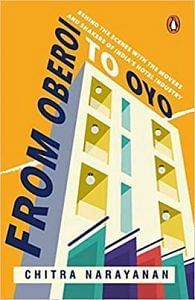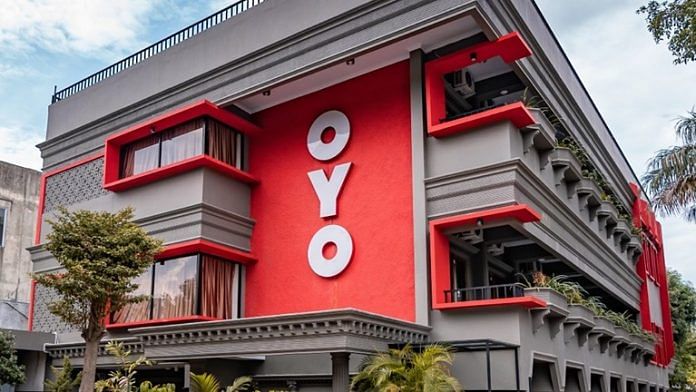From Kashmir to Kanyakumari, travel anywhere in India and one ubiquitous sign stares out at you from billboards, hoardings on the road and nondescript buildings. You could see the same sign in Japan, China, the Philippines, the UAE and a host of other countries: the jaunty red logo of OYO. For a hotel brand set up only in 2013, OYO has achieved spectacular, unimaginable scale.
In 2018, it had 4,50,000 rooms globally and a presence in 500 cities and its target of 1 million rooms appeared to be quite achievable. Its valuation was far more than India’s largest hotel company, the over 100-year-old Taj. And imagine, OYO’s founder Ritesh Agarwal was just eighteen years old when he dreamt up this company in 2012.
A year later, at nineteen, he registered Oravel Stays Private Limited. It’s a company that has defied all odds, all expectations and all naysayers. There were plenty of people deriding the company right from the beginning. When OYO first came up, legacy hoteliers looked down their noses at the company, saying it was no competition. But when its valuation began to rise and its pricing strategy began to hurt them, legacy hoteliers banded together to criticize the young start-up’s practices. They whined about OYO’s business model at every forum and demanded regulations against it. Undaunted, Agarwal carried on, tweaking the model here, acquiring a tech company there, and adding innovations bit by bit. By 2016, hoteliers were beginning to admit that OYO was competition.
Also read: Oyo is firing thousands of workers across India and China
In August 2016, at the 115th annual general meeting of Indian Hotels Corporation Limited, the Tata Group’s then chairman Cyrus Mistry admitted to shareholders that they needed to keep an eye on Ritesh Agarwal’s OYO. This spoke volumes about the disruption the young upstart has caused. If further proof were needed, it comes from the fact that OYO’s model spawned at least thirty copycats. When OYO started, it aggregated budget hotel rooms run by independent owners. There were many problems with this model because instead of getting the entire hotel, it would get some rooms, which it branded. The rest of the hotel remained unprepossessing. Also, there was a price disparity between the room sold on OYO and that the budget hotel owner was trying to sell on his own. OYO would be selling at discounts, while the hotel owner would sell at his own rate and nobody would take it. So, their occupancies suffered. Not surprisingly, everyone complained bitterly about OYO’s model.
It was a bit akin to when Uber and Ola took off in India, the old black-and-yellow taxi drivers went ballistic. In OYO’s case similarly, established hoteliers were annoyed. Unlike the chains who were only looking at converting well-known standalone properties, OYO did not bother with frills or management fees, only going in for standarization and convenience and choosing the franchise route and offering lower rates. The industry had no choice but to start discounting.
As one irate hotelier lashed out, ‘We were being hit by a technology platform consolidating mom-and-pop establishments that are poor on compliance and selling them like a hotel chain.’ For someone so young, Agarwal handled the criticism maturely. He admits that negative reviews on platforms like TripAdvisor hurt him but he got down to the job of addressing these by auditing guest experiences. He got a team of auditors to go around with a 150-point checklist to review a hotel that had been remodelled as an OYO. He also rapidly changed the aggregating rooms model to own inventories through a franchised route. At every forum he began disowning the aggregator term. ‘It’s the media that has branded OYO as an aggregator—I would call OYO a branded-hotel franchise model,’ he said. But unfortunately, the tag stuck. If you break it down, OYO’s model is surprisingly simple.
On the one hand, there are millions of mom-and-pop show kind of hotels all over the country of inconsistent standard and quality. On the other hand, for the common consumer there was a lack of affordable, quality, branded-hotel room supply. OYO looked at the problem from both sides and solved it by putting technology, reach and branding into the hands of tiny nondescript hotels who could now offer rooms in great locations at discounted rates. Basically, OYO went after the millions of small hotels near railway stations, bus stations etc., and renovated and branded them. Distribution using technology innovatively also helps these hotels. Early on, Agarwal recognized the strength of a mobile platform.
Also read: Byju’s becomes India’s most valuable start-up after Paytm, OYO
The OYO app is perhaps one of the most downloaded app in India. Ninety-five per cent of its bookings come through direct channels so it is one of the few players that has broken the OTA clout and saves enormously on distribution costs. This allows it to invest more in marketing. Although Agarwal had no experience in hoteliering, he solved two important problems, that of lack of availability faced by consumers with regard to good and affordable rooms and the challenge of discoverability faced by hotel operators bringing innovation into a sector that was steeped in traditional thinking. Very soon, he became a poster boy for India’s startup story, attracting funding easily.
Venture capitalists and private equity funds—which had hitherto never looked at the hotel sector—began investing in droves into OYO, thereby infusing the industry with much-needed capital to grow. Even if traditional hoteliers had no faith in OYO’s model or its way of doing business, Softbank, Lightspeed Ventures, Sequoia Capital, Hero Enterprises, China Lodging, DSG Consumer Partners, and several others invested in the OYO story in a big way. In 2019, even Airbnb took a stake in OYO. If OYO opened the keys to new room supply, it also unlocked new consumers. Taking a leaf out of cab aggregator Ola’s on-demand model which made cabs accessible and affordable and thus got thousands of new users into the taxi pool, OYO expanded the customer base of branded hotels by making them available, predictable and affordable.
Suddenly, backpackers, students, people who stayed with relatives, night-train travellers who just needed a shower and change but were loathe to pay huge sums for a hotel room, all began choosing OYO. Voila! A stagnant market that was hovering around 90,000 branded-hotel rooms began growing at a fast clip.
Agarwal says two things have defined OYO’s journey. One, constantly being innovative. Two, always keeping in mind how it could bring convenience to the Indian consumer’s hotel experience. This is what led to radical things like introducing sunrise (6 a.m.) check-in and a new relationship category by which unmarried couples could book a room. Says Satbir Singh, founder Thinkstr which helped OYO with its brand strategy, ‘Disruption and innovation is in OYO’s DNA. We have seen that in the way the company is evolving, in the way they developed offerings like a 6 a.m. check-in, entry for couples in love and so on. The brand has been built on accessibility and they have never shied away from being a budget traveller’s first choice.’
Also read: OYO gets minority panel notice, told to list actions taken after Kashmiri man denied room
OYO also used technology in literally every aspect of the budget hotel business to make it highly efficient. From sourcing supplies centrally to managing housekeepers and setting rates, OYO found a tech solution for a host of processes, helping its owners. On the customer side, it managed to get a pulse on their needs. It relied heavily on data sciences to study consumer behaviour and deliver to users just the experience they want. OYO records more than 7,50,000 bookings every month.
When the analytics team plotted the geo locations of where the bookings originated from, it saw that many of the bookings were happening on highways and road routes, implying that people often book on the way to a destination or at a destination. So, OYO made bookings convenient for last minute check-ins. Similarly, by looking at data of cities that generate most bookings and clusters of feeder cities, it offered targeted supply. But let’s go back to the beginnings. How in the world did this ridiculously young entrepreneur (is nineteen even an age to start up!) ever have the guts to launch something so audacious?
 This excerpt from From Oberoi to Oyo: Behind the Scenes of India’s Hotel Industry by Chitra Narayanan has been published with permission from Penguin Random House India.
This excerpt from From Oberoi to Oyo: Behind the Scenes of India’s Hotel Industry by Chitra Narayanan has been published with permission from Penguin Random House India.




Thanks a lot Oyo…It thinks about middle class people also…. Wish you all the best Ritesh & your team for your excellent efforts for dreams come into reality…
I stayed at a oyo motel
The nastiest motel I have ever seen . Sheets were stained room smelt like urine and smoke I ASKED FIR CLEAN SHEETS THE DESK GUY BROUGHT ME ONE IT WAS DIRTIER THE OTHER ONES! My daughter and I were traveling alone it was late and we didn’t want to go looking around a strange town
Oyo has made the journey and stay of middle and lower middle class easier.thank you oyo!
Why my comment is not reflecting?
OYO a disaster. How can we accept OYO as largest Hospitality service provider/ Indias largest Hotel company? What is Mr Ritesh experience in this industry ? OYO is nothing but a mediator in between the Property owners and the customer.
OYO has no business ethics.
Mr Ritesh is only interested in making money and wanted to be in media.
Matter of fact, OYO ruined Hospitality industry.
Seems like your basics are not right….Author has already answered your questions. Still make a note of them again in your dairy:
How can we accept OYO as largest Hospitality service provider/ Indias largest Hotel company?
Ans. Except you everyone knows and author has clearly mentioned that OYO operates close to 0.45 M rooms across globe, thereby making it world’s largest Hospitality Organization.
What is Mr Ritesh experience in this industry?
Ans He is now at least 7 yr old in Hospitality Industry and how does it matter. You keep spending your entire life on a rigid thought, and learn not to appreciate someone younger, who thought much much ahead of you. Or else you mean to say that even Cyrus Mistry is less wiser than you.
OYO is nothing but a mediator in between the Property owners and the customer. OYO has no business ethics.
Ans. High chances that you are a hotel owner. You are cribbing the same way, as what the taxi drivers are cribbing when Ola Uber revolutionized cab booking.
Mr Ritesh is only interested in making money and wanted to be in media.
Ans. Obviously, he is not here for charity, unlike you.
Matter of fact, OYO ruined Hospitality industry.
Ans. Right….just like Ola and Uber did to cab booking. Sounding like a hotel owner.
Its guts and Lateral thinking skills. Eye opener for management students who wants the safety of of service. Though equally true for young graduates.